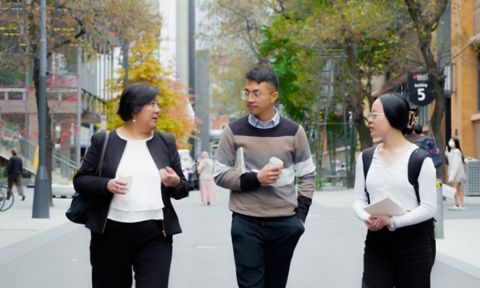#1: Reevaluate your goals with purpose
Take a moment to ensure that your objectives for 2024 still resonate with your aspirations and ambitions. Whether you aim to step into a leadership role, learn new skills or exceed key performance indicators, reevaluating your goals provides clarity and direction. Define clear objectives, break down big goals into smaller, manageable tasks, and ensure they are specific, measurable, and aligned with your career trajectory.
A great way to do this is to revisit and refine your CV. By updating your professional profile to showcase your current skills, interests and values, you can reflect on your achievements and ensure your goals align with your career trajectory. This approach guides your progress and positions you for advancement in a competitive job market, ensuring you’re prepared for the next promotion or job opportunity.
#2: Draw inspiration and support from your LinkedIn network
Harnessing the power of LinkedIn goes beyond mere networking – it’s about finding inspiration for your career goals from the stories and connections of others.
As an RMIT alum, you’re part of a 520,000 strong global community spanning 150 countries and brimming with diverse professionals. Through regular engagement with fellow alumni, both online and through international chapters, you can cultivate meaningful connections and draw motivation from their journeys and achievements.
Reading inspirational alumni stories may spark a new idea or give you the confidence to be more active in community spaces. Active participation could look like sharing valuable insights and expertise on your profile, contributing to industry discussions and establishing yourself as a thought leader within the RMIT community and beyond. By immersing yourself in this supportive network, you can gain valuable insights and foster a sense of camaraderie and shared success among fellow alumni.
#3: Volunteer for impact and broaden your experiences
Contributing to causes that resonate with your passions can be more than just charitable – it can also benefit your career by shedding new light on your goals for the year.
Volunteering allows you to connect with like-minded individuals and exposes you to diverse experiences that shape your skills and outlook. It can be the perfect way to reconnect with your broader purpose and goals beyond your career, and can even pave the way for unexpected opportunities.
Volunteering can also help you stand out to employers if finding a new job is one of your goals. Demonstrating a dedication to social responsibility showcases your depth as a professional, and can also illustrate your skills beyond the workplace.
#4: Find balance and preventing burnout with passion projects
Maintaining an equilibrium between your career and personal life is essential for sustained fulfilment and preventing burnout.
Embrace hobbies, passion projects and interests outside of work to foster creativity and maintain a sense of fulfilment. Writing a novel, starting a podcast, launching a small business, or volunteering for a cause can rejuvenate your spirit and fuel your creativity.
To achieve balance, set clear boundaries between work and personal pursuits. Clearly communicate your availability, set specific times for work-related tasks and private activities, and stick to them as much as possible. Prioritise self-care and enforce boundaries by minimising work-related distractions during your leisure time.
Regularly reassess and adjust your boundaries to ensure you effectively preserve work-life balance. By proactively managing your time, energy, and priorities, you can prevent burnout and excel in your career and personal endeavours.
#5: Take the next step with RMIT’s 1:1 career support
Need a little extra help to get back on track with your career goals? Embark on the next phase of your career with RMIT’s one-on-one graduate career support*.
If you’re an RMIT alumni, you can take advantage of our personalised career advice through our one-on-one career support*. Discuss your goals and challenges with our dedicated career consultants, who can offer tailored guidance for your professional journey. Together, we’ll help you define your career aspirations, provide industry-specific advice, refine your CV, and prepare you for interviews. By taking advantage of RMIT’s one-on-one career support, you’ll stay motivated and forge ahead in the job market.
*Note: 1:1 future postgrad consultations are not currently available - new support options will be available soon.
Ready to make the most of your RMIT experience? Connect with RMIT and fellow alumni, share your journey, and continue the conversation.






